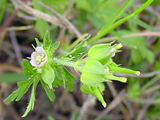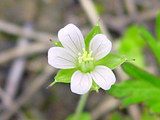Native Plants

Q. Who is Mr. Smarty Plants?
A: There are those who suspect Wildflower Center volunteers are the culpable and capable culprits. Yet, others think staff members play some, albeit small, role. You can torture us with your plant questions, but we will never reveal the Green Guru's secret identity.
Did you know you can access the Native Plant Information Network with your web-enabled smartphone?
Ask Mr. Smarty Plants is a free service provided by the staff and volunteers at the Lady Bird Johnson Wildflower Center.

rate this answer
Sunday - July 26, 2009
From: Mt. Clemens, MI
Region: Midwest
Topic: Non-Natives
Title: Care of potted non-native geraniums
Answered by: Barbara Medford
QUESTION:
I live in lower Michigan (Mt. Clemens) and recently purchased 2 small, potted geraniums. They are a beautiful vibrant red in color. As the blooms wilt and turn dark, should I snip that part off the stem or just remove the darkened petals?ANSWER:
There are three species of the genus Geranium native to Michigan, and we're betting none of them are the plant you have. They are: Geranium bicknellii (Bicknell's cranesbill), Geranium carolinianum (Carolina geranium), and Geranium maculatum (spotted geranium). We'll show you some pictures of a couple of these, and we're sure you will agree that is not what you have. We are pretty sure none of this genus have bright red flowers.
The plants usually sold in the nursery trade under the name "Geranium" are, in fact, members of the Pelargonium genus, which is indigenous to South Africa. At the Lady Bird Johnson Wildflower Center, we are dedicated to the care, preservation and propagation of plants native not only to North America but to the area in which they are being grown. However, while your plants will not appear in our Native Plant Database, we can tell you that it is always a good idea to clip off the stem of a bloom that has wilted, as well as leaves that are yellowing. This website from Flower Gardening Made Easy: Growing geraniums-Great in the garden and in pots, does, indeed, tell you in the first paragraph that they are actually talking about pelargonium. From Google, here are more pictures of your plant.
\
From the Image Gallery
More Non-Natives Questions
Roses for Austin soil
May 01, 2014 - What roses would work in the soil near Lake Austin Spa?
view the full question and answer
Elimination of non-native English ivy in Maryland
March 11, 2009 - I have Old English Ivy sprouting up throughout my side yard. What can I do to get rid of it? Would putting lime down help or Crabgrass control? What would you suggest and the easier the better as I...
view the full question and answer
Plant replacements for non-native invasives in Austin, TX
April 20, 2007 - I live in Austin, TX, I have a large lot and small house. I want to do some selective planting on the back half of my lot. Currently there are large live oaks, cedar elm. hackberry, cedar, Texas persi...
view the full question and answer
Pruning and deadheading rosa rugosa while blooming
August 01, 2008 - Can you prune the dead flowers and branches of rosa rogosa while it is still blooming?
view the full question and answer
Groundcovers to choke out invasive species in Virginia
June 08, 2015 - My yard has open woods and dappled light with clay soil. Thirty years ago we removed huge briars and since English Ivy was getting in by itself, we thought we would let it come; unfortunately, it not ...
view the full question and answer
| Support the Wildflower Center by Donating Online or Becoming a Member today. |


